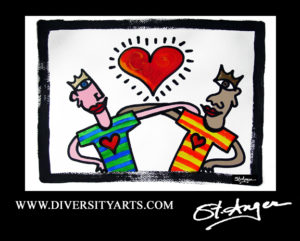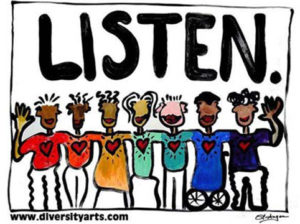
Watching the video documentary series, Eyes On the Prize, on public television during Black History Month, I am inspired by the courage of all those who stood up for justice during the Civil Rights Era, some of whom even had to give their lives for the cause of racial equality when confronted with the stark hatred that fuels senseless violence. In the video, the African-American thought leader and activist, Stokely Carmichael, was interviewed after a White minister had been killed during a civil rights march, and Carmichael wondered aloud, why did the public suddenly become outraged and more unified at the killing of this White activist while many Black activists had also been killed during their participation in such actions for justice. Their lives… and their deaths… didn’t seem to matter to the general White population.
Are we so polarized, Black and White, that we cannot care about the lives of those we perceive to be entirely separate from us based on superficial reasons such as the shade of one’s skin?
Before Carmichael spoke these words, I, too, thought them. As a White woman who cares very much about equalizing the playing field for African-Americans, improving the quality of Black and African-American lives, healing racism and social injustice, and being an ally as the pride of African-American people everywhere is growing stronger… I stand with my African-American sisters and brothers who demand to be seen and heard, to be listened to and cared for, to be valued and acknowledged.
I want my life to be seen as important, yet not more important than the life of someone who perhaps has more melanin. We are equals. That is how I want us to see each other and be seen by each other.
I want my White brothers and sisters to be equally enraged about the murders and the mistreatment of people of African-American heritage, as they would be if the victims were White. Black Lives Do Matter. Black Lives Matter Just as Much as White Lives. I am saying this because I know that many White people feel that only White Lives Matter. And they do feel that White lives matter. They value White lives, Whiteness, and everything White.
Yet, I would like my White sisters and brothers to consider all of the African-American nurses and doctors in hospitals everywhere who care for the sick, no matter the color of their skin. Think of all of the caregivers, who care for the elderly and the disabled. Think of all of the teachers, aids, tutors, crossing guards and childcare workers, who care for the children, no matter their race or color. Think of all the leaders in government who make decisions that take into account the needs of people of all races. Think of post office workers, mail carriers, and delivery people who deliver our packages on time. Think of firefighters, emergency medical technicians, and others who respond during life-threatening crises and emergencies. Think of soldiers and veterans who go to battle for us. Think of judges, attorneys, and law enforcement officials who protect us. Think of scientists and inventors who develop their ideas into new products and services that benefit us all. Think of spiritual leaders, religious clergy, and lay leaders who inspire us, offering prayer and encouragement. Think of academicians, professors, researchers, scholars, and authors who shape our minds, nurture our intelligence, and coax our intellect. Think of artists, dancers, poets, and musicians who make us smile with delight and take our souls to new heights. Sports heroes, athletes, and fitness leaders show us we can overcome personal challenges, enjoy teamwork whether we win or lose the game, and enjoy the strength of our own bodies while listening to the heart that beats inside of us. Therapists, social workers, counselors, psychologists, psychiatrists, and healers of all types mend our bodies, minds, hearts, souls and spirits, helping us to invite forward and integrate the parts of ourselves that we once rejected to align with our authentic selves. Fashion leaders, thought-leaders, motivational speakers, television and radio personalities also inspire us to be our best selves. Communicators, mediators, and facilitators help us build understanding, make peace with the others with whom we share the world, and bring justice. Small, local business owners provide for their surrounding communities, while big business owners and CEOs show us responsible leadership and environmental stewardship on an even larger scale. Line workers and factory workers incur callouses during long sleepless hours. Transportation workers help all of us travel to work each day by train and by bus. Food and restaurant employees, and those who run establishments where we all dine, make food that is good and safe to eat. Farmers grow our food, truck drivers deliver it, and supermarket workers stock it on shelves for us to purchase when God blesses us with the financial resources to be able to buy it.
African-American people contribute daily to the quality of White Lives and we all depend on them. Let us, White people, contribute daily to the quality of Black Lives and let them count on us.


